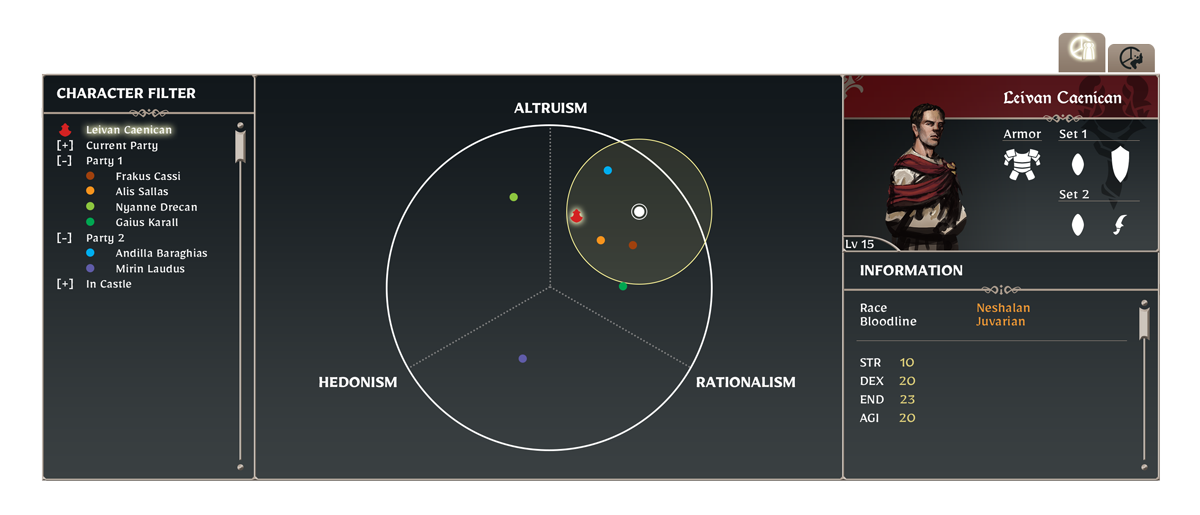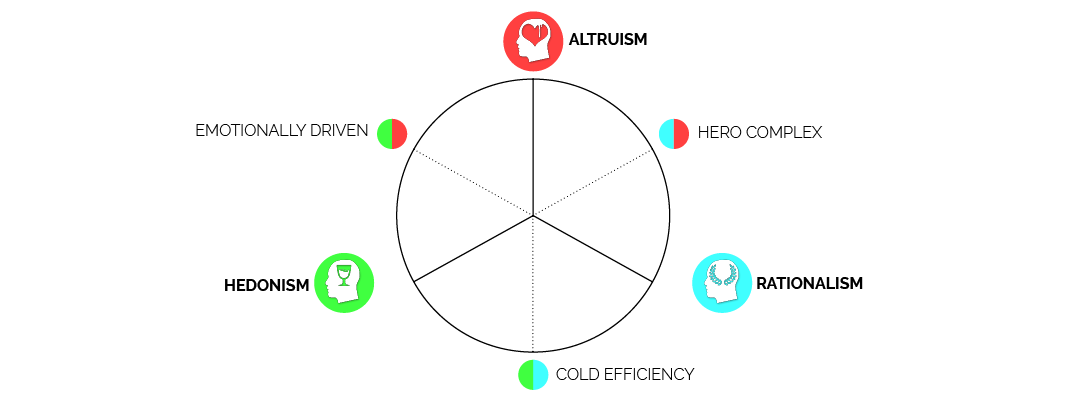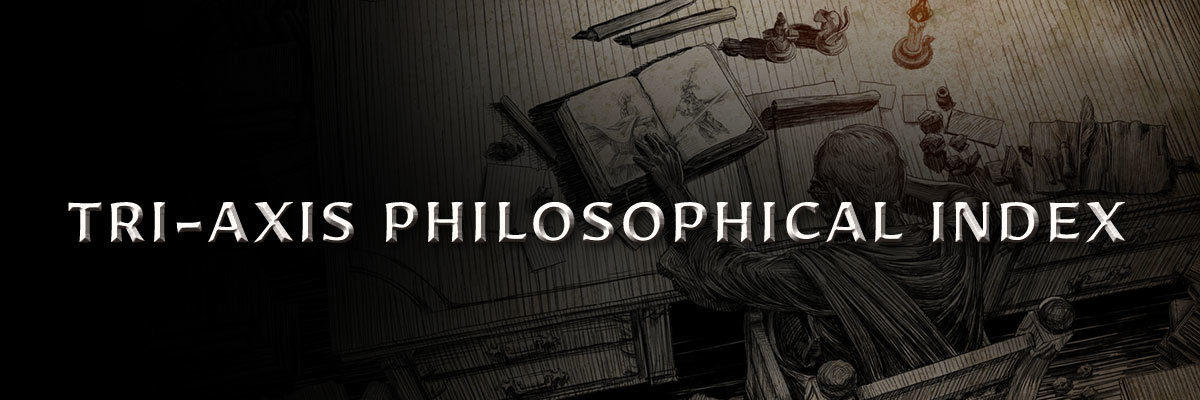Hey guys,
The studio will be going on break for the winter holidays but with the updates we just rolled out on the front page I thought we’d take some time to talk a little bit more about the Tri-Axis Philosophical Index we have for Forged of Blood.

The last time we talked about the personality system we touched more on the inspiration of the system. To recap: we really wanted to create a system that reflects the “grey” nature of our world and goes the beyond the usual binaries of good vs. evil, light vs. dark, etc. With our focus on choice and consequence, we also felt that it was important that the system have some very real consequences for the player beyond simply being a narrative tool for my whims. So we’d like to take this time to show a bit more of what the system actually entails.
In its current iteration the personality system is divided by three “philosophies” as opposed to “personalities” as to give the fairest interpretation between the three axes that the player will be measured against – and to try our best in removing overtly positive or negative connotations. Lorewise, the three philosophies represent three schools of thought that have shaped the world and upon which the denizens of Attiras are judged.
Altruism, Hedonism, and Rationalism make up the three axes of the circular index in which players will be plotted. The player, every playable character, Leivan (the brother King) and every conquerable region will have their own Philosophical Plot Point (PPP) that may shift throughout the duration of the game through direct and indirect player actions. With player’s parties and decisions acting as the unequivocal representative of the crown, Tavias’ plot point will act as the central point against which all decisions and consequences will be measured. Around this plot point is drawn what we call the: Philosophical Distance Threshold (PDT), which is a radius drawn around Tavias’ PPP that will denote the moral latitude that the different characters will accept. This plotted point will shift according to the player’s actions as they complete quests and advance the storyline.
This is where the mechanics of the system gets a bit more interesting to us. Playable characters within the radius will remain loyal to the player and be available for use in their parties, while captured regions within this radius will be loyal to your faction and slowly move their PPP towards the player’s over time. Conversely, characters that go beyond the player PDT will leave the player’s faction permanently and regions will have a percentage chance to rebel against the player’s control as time passes. Throughout the duration of the game, the player’s primary goal (aside from the chasing down quests) will be to retake territories throughout the world. As mentioned before, conquered regions will slowly shift their PPP towards Tavias’ PPP as time passes in the game. This leads up to the end-game in which the regional PPPs relative to the player’s will determine the player’s fate in the world.

So how does this all translate into the game loop? While the tactical combat and character progression systems remain core to our game, the added layer of the Tri-Axis Philosophical Index bring in some political choices and management to the non-combat related sections of the game. Your characters and soldiers are key to winning in battle – but if your choices pushes them beyond your PDT then you will quickly lose your effective fighting force. On top of that is the emphasis of the Philosophies’ impact on the world at large. Regions – controlled by a regional lord will have their own PPP like we mentioned, but doing a quest that gets the lord killed or replaced will give an entirely new PPP for that region, and this may or may not work in the player’s favor.
The endgame comes down to how many regions are in “favor” with the player’s PPP – calculated simply by distance between the three Faction PPPs. So while conquering regions is important, managing your PPP – and thereby the consequences of your actions – is key to effectively win the final end-game conditions. I won’t give away anymore than that as we do have a few things planned for the storylines that work in tandem with this mechanic, but I hope that does help paint a better picture as to the system we’re building out.
(If you’re not interested in the philosophical definitions and the reasons why we chose the three “philosophies”, stop here – continued wall of text below.)
I’ll now touch on the three philosophies that we chose to form the three axes of the index. This was a subject that we discussed at length, starting with our first iteration of the three as: Empathy, Hedonism, and Wisdom. Empathy meaning the ability to understand the feelings of others, Hedonism being the pursuit of self-indulgence, and Wisdom being the exemplar of good judgement, knowledge, and experience. While those worked well in the beginning, I began running into problems in writing them into the world, especially when we are writing for a singular character whose actions reflect how an entire faction will be viewed.
That line of questioning eventually led to the shift from Personality to Philosophy. It’s a schematic difference, but one that allowed me to write in a plausible reason as to how the player’s actions will impact his faction as a whole. Tavias – the player character – is in essence the face of the crown to the world while his brother Leivan secrets himself away to find other solutions to the conflict at hand and any hidden knowledge that might save his family line. Therefore, the PPP of player/Tavias that we plot on the Tri-Axis Philosophical Index is a reflection of the world’s view on his actions in accordance to the three philosophies.
Using the three Personalities as a base, we finally went with Altruism, Hedonism, and Rationalism. As a whole, the three words actually fit better. As we see it: Rationalism is a more neutral version of Wisdom, and Altruism is a more detached form of Empathy. Hedonism had always been the challenge as it has some inherent connotations to it, but in principle is still all about finding the option that benefits the self the most. When put into the three axes, each philosophy works out to be the direct opposite of a combination of the other two.
For example: Altruism – selflessness, concern for others – is both characteristically the opposite of hedonism and not very rational. Hedonism – pursuit of self-indulgence – is both the opposite of altruism and is actually rather rational if you think about it. While Rationalism, is a direct counter to both Altruism and Hedonism as it is all about reason over emotion,
At the risk the drawing you into a full blown debate, I will give a cursory explanation of the definitions we set for these and the reasoning behind them. So let’s start by defining Rationalism and certain priorities that we might agree can be defined as the practice of Rationalism. Self-preservation is a biologically rational line of thought, as is the sacrifice of something small for a larger purpose, that’s just math and basic sense of self. Now, when we add in the complexities of human emotion and societal morals, we can see some shortcomings in pure and cold rationalism. So in that regard we can also measure the other two philosophies. Altruism is the practice of selflessness, and in the contemporary moral compass, is perhaps the highest ideal in which we can aspire to. However, if we were to measure it against Rationalism, it is inherently counter to the idea of self-preservation and we start to have some moral grey areas when it comes to sacrifice for the greater good. Hedonism on the other hand is the pursuit of self-indulgence, while this goes well with self-preservation, hedonism will inherently clash with the idea of the greater good and working for the benefit of others.

This gives us a stage in which we can set in motion the various faction ideals and motivations in the game. If we were to look at the direct opposites of each axes we can come to a few short generalizations. Rationalism is the direct opposite of the pure emotion that comes with Altruism and Hedonism, while Altruism is the direct opposite of cold self-serving efficiency. On the other end of the spectrum is what we define as the traditional hero complex: that almost fantastical notion of the perfect balance between selflessness and reason. In the most pedestrian narrative trope, the hero’s journey is one that follows a righteous path that is often difficult and downright foolhardy. Therein lies the commentary I’d like to make with this game. The edges of the index represent the extremes – and in each extreme we see the obvious negative connotations.
The edges of the index represent the extremes – and in each extreme we see the obvious negative connotations while still having their own merits. War, politics, and society as a whole are awash in grey areas, and Forged of Blood is no exception. We are trying to design an experience that will put players into situations where certain decisions might clash against their own moral code but are necessary to retain their followers. We want players to decide between mechanical efficiency and their own views, while also thinking about the objectives put forth in game’s storyline.
Personally speaking, I think our morality system works well, with the PPP and PDT mechanics interlaced nicely within the core game loop. However, the onus now falls on the narrative content to bear the weight of the mechanics, and I hope that my team and I can live up to the lofty goals we’ve set. So I’ll leave it here for now – thank you for reading and indulging my wall of text.
Happy holidays from the Critical Forge team and we can’t wait to see you in 2018.


Leave A Comment